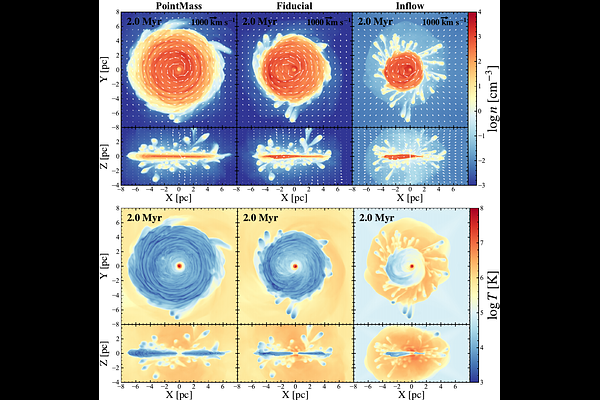Wind-fed Supermassive Black Hole Accretion by the Nuclear Star Cluster: the Case of M31*

Wind-fed Supermassive Black Hole Accretion by the Nuclear Star Cluster: the Case of M31*
Zhao Su, Zhiyuan Li, Zongnan Li
AbstractThe central supermassive black hole (SMBH) of the Andromeda galaxy, known as M31*, exhibits dim electromagnetic emission and is inferred to have an extremely low accretion rate for its remarkable mass ($\sim10^8~\rm~M_\odot$). In this work, we use three-dimensional hydrodynamical simulations to explore a previously untested scenario, in which M31* is fed by the collective stellar mass-loss from its surrounding nuclear star cluster, manifested as a famous eccentric disk of predominantly old stellar populations. The stellar mass-loss is assumed to be dominated by the slow and cold winds from 100 asymptotic giant-branch stars, which follow well-constrained Keplerian orbits around M31* and together provide a mass injection rate of $\sim4\times10^{-5}\rm~M_\odot~yr^{-1}$. The simulations achieve a quasi-steady state on a Myr timescale, at which point a quasi-Keplerian, cool ($T\sim10^3-10^4~\rm K$) gas disk extending several parsecs is established. This disk is continuously supplied by the stellar winds and itself feeds the central SMBH. At the end of the simulations at 2 Myr, an accretion rate of $\sim2\times10^{-5}\rm~M_\odot~yr^{-1}$ is found but could vary by a factor of few depending on whether the subdominant gravity of the NSC or a moderate global inflow is included. The predicted X-ray luminosity of $\sim10^{36}~\rm erg~s^{-1}$, dominated by the hot ($T\sim10^7-10^8~\rm K$) plasma within 0.2 parsec of the SMBH, is well consistent with Chandra observations. We conclude that the feeding mechanism of M31* is successfully identified, which has important implications for the working of dormant SMBHs prevalent in the local universe.